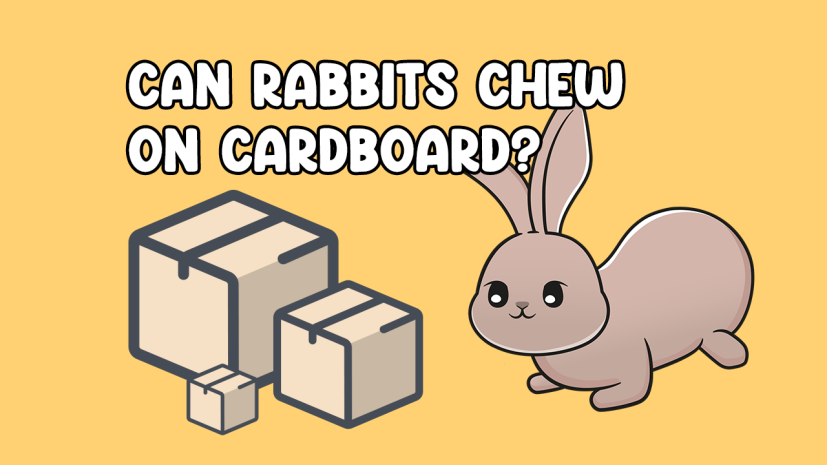
As proud rabbit owners, you would have noticed that these cute little furballs have an innate urge to chew on nearly everything. Because of this, it’s essential to understand what’s safe for them to nibble on and in what quantities.
Now onto the million-dollar question: Can rabbits chew on cardboard? The simple answer is yes but with a few caveats. Cardboard is generally safe for rabbits, primarily made from wood pulp. However, not all cardboard is created equal.
Cardboard is completely safe for rabbits to chew on in its most basic form. However, the crucial point is the amount of cardboard your bunny ingests.
While a little bit of cardboard passing through their system won’t cause harm, the trouble starts when every shredded piece becomes a part of their meal. Large quantities of cardboard can lead to intestinal blockages – an uncomfortable and potentially dangerous condition for your rabbit.
Despite being a favorite chewable, cardboard doesn’t pack much nutritional punch. It should never be viewed as a component of a healthy rabbit diet.
Excessive cardboard consumption can deter your bunny from munching on their leafy greens or hay, leading to nutritional deficiencies and health problems.
Remember, cardboard is for fun and dental health, not for nutrition. Always ensure your rabbit’s primary diet remains balanced and nutritious.
Rabbits continuously grow teeth, requiring constant chewing to maintain their length and health. While the primary tool for this is fresh, high-quality hay, cardboard can also contribute to this process.
Cardboard toys and houses serve a dual purpose – they provide entertainment and a means for dental care, helping to keep your bunny’s teeth in great shape.
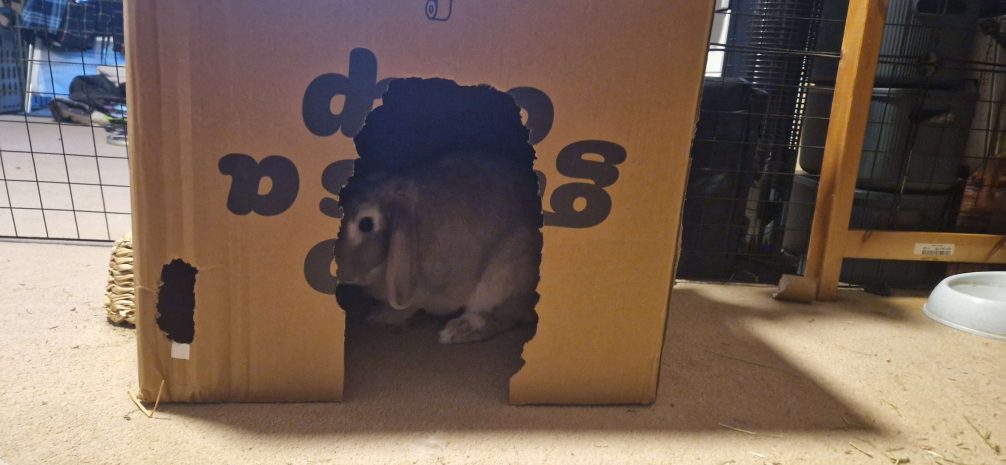
Some cardboard may contain harmful chemicals from inks, dyes, or other treatments. Additionally, if a rabbit consumes too much cardboard, it could lead to digestive problems due to the lack of nutrition and high fiber content.
You may have come across adorable printed cardboard hides and toys, and might be wondering if they’re safe for your bunny. The ink used in most packaging materials today is generally non-toxic. So, those eye-catching printed cardboard items can still make a fun addition to your rabbit’s playtime. If you haven’t discovered these playful items yet, be sure to explore them later in this article!
So whilst your rabbit can safely nibble on cardboard, monitoring their chewing habit and diet is essential. Additionally, cardboard can be a choking hazard if not chewed properly and can cause blockages in the gut leading to GI Stasis.
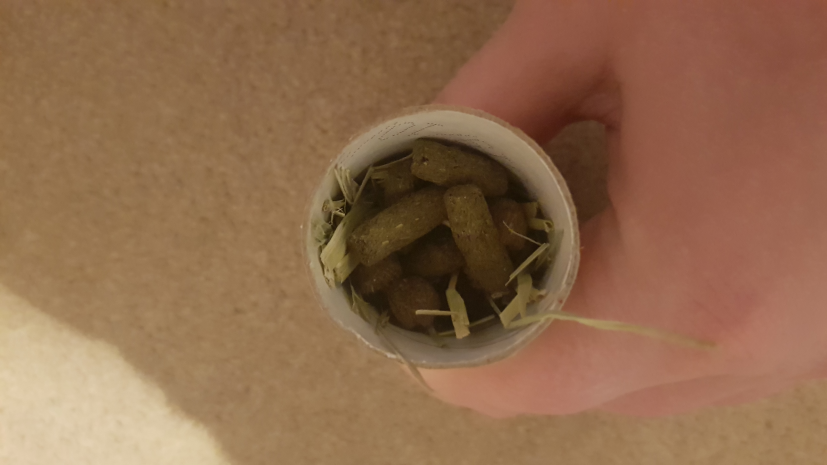
Cardboard boxes can be excellent toys for rabbits. They love to hide in them, jump on them & chew them. So feel free to provide your bunny with a small cardboard box to play with and chew.
We find hiding pellets inside a toilet roll, for example, is a fantastic way of providing enrichment. Additionally, purchasing cardboard toys from sites like Amazon can be a fantastic way of keeping your rabbit active.
Treated cardboard generally refers to cardboard that has been chemically treated for various reasons. These treatments can include coatings to resist moisture, increase strength, or enhance appearance. Some cardboard may also be treated with chemicals to enhance durability or resist pests.
While these treatments might make the cardboard better suited for certain uses, they’re not necessarily safe for rabbits. These chemicals, if ingested, can potentially harm your rabbit. Even in small quantities, the long-term effects of these chemicals on a rabbit’s health are not entirely known and are best avoided.
Printed cardboards present another potential hazard due to the inks used. While some inks are vegetable-based and non-toxic, many inks can contain heavy metals or other toxic compounds.
Even if the ink is labeled “non-toxic,” it’s safer to avoid it. Non-toxic typically refers to acute toxicity, meaning it’s not immediately harmful.
However, chronic toxicity—the impact of long-term, repeated exposure—is often a grey area, and with something as important as your rabbit’s health, it’s best to err on the side of caution.
Cardboards often contain adhesives used in their manufacturing process. These adhesives can contain various substances that, while fine for us humans, might not be safe for a rabbit to ingest.
Moreover, certain cardboard may be dyed to achieve specific colors. These dyes, like the inks used in printing, can contain potentially harmful compounds.
However, there is an exception to this rule: food dyes. Certain food dyes, often used to produce rabbit-safe toys, are non-toxic and safe for consumption.
These dyes are typically used to make toys more visually attractive for the pet owners, not the rabbits (since rabbits do not perceive colors the same way we do).
Nevertheless, if you want to add a touch of color to your rabbit’s chewable, products dyed with food-grade dyes can be an option.
Regular dental check-ups are necessary regardless of what your rabbit is chewing on. These will help ensure that your bunny’s teeth are in good health and are not growing too long, despite their chewing habits. Regular check-ups also help detect potential dental issues early, allowing prompt treatment.
Monitor your rabbit’s behavior closely. If you notice your rabbit is consuming the cardboard instead of merely chewing on it, or if there are any changes in their eating or excreting habits, it’s time to call your vet. These could be signs of potential health issues requiring immediate attention.
As stated before, cardboard can be an excellent, cost-effective resource to keep your bunnies entertained and limit their destructive tendencies. We use Cardboard over the top of doorways (For when the door is closed) to stop our rabbit from digging at the carpet and the bottom of our fence panels and furniture.
There are countless options to craft engaging and safe cardboard toys for your bunnies. A ‘Rabbit Dig Box’ filled with shredded cardboard can provide hours of fun for your rabbit, allowing them to indulge in their natural burrowing instincts.
Toilet paper tubes offer another DIY opportunity. You can stuff them with treats or hay, turning them into delightful interactive toys. Re-purposing old shipping boxes into rabbit forts or hides can add a new dimension to their playtime.
Here are our favorite cardboard toys we’ve purchased and tested:
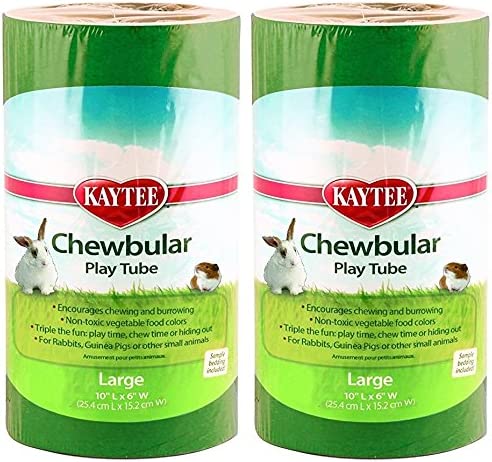
These will continually roll away from your rabbit, giving them a reason to move around! With the amount of cardboard on them, these will last a long time.
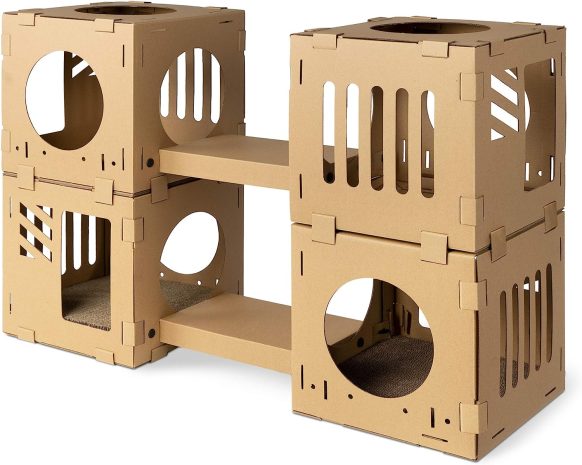
These modular cardboard houses might be designed for cats, but they’re fantastic and can be interchanged with other pieces. We recommend not building this too high, but this works for small and medium sized breeds.
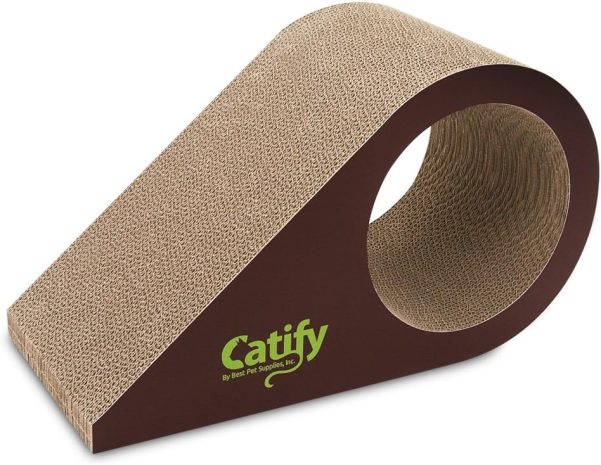
Corrugated Cardboard Scratcher
Another toy that works fantastic for rabbits, these can also have replacement mats added to them, but we recommend keeping it as it is. This fantastic toy works not only as a tunnel but also as a ramp and chewing toy.
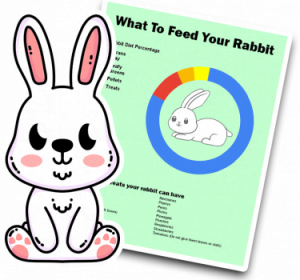
By entering your email address you agree to receive emails from Cottontailclub. We'll respect your privacy and you can unsubscribe at any time.